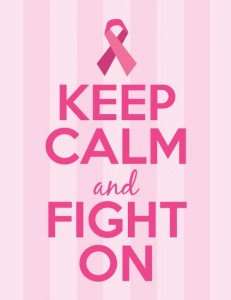
It can take the lives of both women and men. It does not favor a race or ethnicity. It’s breast cancer, and it affects us all.
The month of October is Breast Cancer Awareness month. It is our time to celebrate the lives taken by this disease and to fight with the survivors and caregivers to find a cure.
So, don’t forget to wear pink, participate in an awareness walk, donate, and show your support toward a disease that affects so many.
For more information about early detection and prevention contact The American Cancer Society and the Susan G. Komen Foundation.
Lupin Pharmaceuticals has issued a recall for Mibelas 24, lot L600518, Exp 05/18. Due to a packaging error, the pills may not prevent pregnancy. The recall was issued May 25th but is just making the news now.

We’re almost half way through breast cancer awareness month. Bring Your Brave is a new campaign focusing on young women with breast cancer. While breast cancer usually effects women over the age of 45, it does occur in about 11% of younger women. Breast cancer can be hereditary however that’s not always the case. There are ways you can reduce your risk of getting breast cancer such as limiting your alcohol intake, maintaining a healthy weight and breastfeeding.
Breast cancer symptoms include but are not limited to:
- Lump in the breast or underarm/armpit area
- Thickening or swelling of part of the breast.
- Redness or flaky skin in the nipple area or the breast.
- Nipple discharge other than breast milk, including blood.
It is important to get screened if you notice any symptoms early on, in order to start fighting back sooner than later.
For more information, visit:
http://www.cdc.gov/cancer/breast/young_women/bringyourbrave/index.htm
http://www.cdc.gov/cancer/dcpc/resources/features/breastcancerawareness/
“A woman’s first responsibility is to make an effort to do what she wants to do.” —sage advice?áfrom?áDr. Winston Weese, Emeritus Associate Professor, Department of Obstetrics and Gynecology at LSU Medical School
You never know what you will chance upon when you browse the LibraryÔÇÖs Newspaper Clippings Collection. Trolling for this monthÔÇÖs topic took me on a journey through various strange perspectives on womenÔÇÖs health.
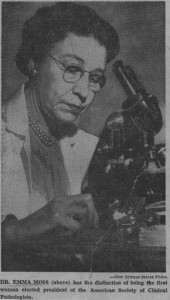
In 1959, convention speakers discussed ÔÇ£gyno-psychiatry,ÔÇØ ÔÇ£a very basic and superficial type of psychiatry [that] is primarily reassurance. Sometimes a woman is infertile because she believes her husband does not love her. Or vice versa. What we are trying to do today is to make the infertile woman realize that help is possible: that they donÔÇÖt have to just grin and bear it.ÔÇØ One article from 1961 blames men for womenÔÇÖs anxieties: ÔÇ£The American man isnÔÇÖt asserting his male dominance.ÔÇØ The piece is full of quotable gems like, ÔÇ£The wise woman of course, vocally credits her husband with leadership even when he does not have itÔÇØ and ÔÇ£boosts her husbandÔÇÖs ego even though she may be far superior to him in intelligence.ÔÇØ
Some answered the call for by entering the medical field.?áIn 1931, The Southern Medical Association fielded questions about the rise of women as doctors. At the time, women doctors still combated some suppositions about their patients: ÔÇ£Why should they be all women?ÔÇØ and about their personhood with ÔÇ£frequent assertions that such professions as social work and medicine destroy many of the gentler attributes of the feminine nature.ÔÇØ One of the doctors interviewed was the remarkable Dr. Moss of New Orleans, who said, ÔÇ£ThatÔÇÖs a lot of foolishness on the part of people who donÔÇÖt know us.ÔÇØ
Dr. Emma Sadler Moss rejected a teaching career because she was ÔÇ£not gentle enoughÔÇØ and stood as is a?áshining example?áof a woman doing what she wants. She brushed aside the hackneyed image of the young, gentle Southern woman, preferring the allure of the medical profession, where she excelled. After a stint as a medical technologist, Dr. Moss studied for her M. D., which she earned in 1935 from LSU. From there, she earned the title of Director of Pathology at Charity Hospital, clinical professor of pathology at LSU Medical School, and President of the American Society of Clinical Pathology (notably, the first woman President of the society).
Dr. MossÔÇÖ commitment to these institutions lasted for over thirty years until her death in 1970. She received numerous awards for her work in pathology including being recognized as the 1954 Medical Woman of the Year and as one of ÔÇ£The Six Most Successful Women of 1955.ÔÇØ The Library owns two editions of her lauded text, An Atlas of Medical Mycology, which she co-authored with Dr. Albert Louis McQuown. A full listing of her contributions to LSU Medical School and Charity Hospital can be viewed in A History of LSU School of Medicine New Orleans.
Glimpse of the Past is an ongoing project to promote the?áLouisiana Digital Library effort. This Month in History will present for your reading pleasure a closer look into a newspaper clipping of note from our Digital Collections and articles relating to the LSU Medical School.
Tags: Charity Hospital, Digital Collections, Glimpse, History, This Month in History | Basic Sciences, Medicine, Nursing, Pathology, Psychiatry, Women's Health | Permalink | Comments Off on This Month in History: Don’t Just Grin and Bear It | Posted Friday, July 26, 2013 by Phillips, Holland T.
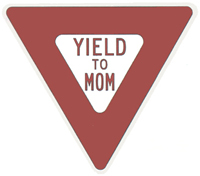 The Centers for Disease Control and Prevention released a feature this week in anticipation of Mother’s Day and National Women’s Health Week.?á This feature, Ways to Help Make Mother’s Day Healthy, offers advice on how Moms can keep themselves healthy for their families.
The Centers for Disease Control and Prevention released a feature this week in anticipation of Mother’s Day and National Women’s Health Week.?á This feature, Ways to Help Make Mother’s Day Healthy, offers advice on how Moms can keep themselves healthy for their families.
They also created a feature, Celebrate Moms who Protect Children’s Health, so Mom’s who don’t smoke deserve extra love!
Last week, MedlinePlus, the National Library of Medicine and National Institute of Health’s consumer health database, published the top 10 most?ávisited health topic searches?áof 2012:
Looking at these searches, it would seem that the public are?ásearching for information on?áthe most common health?áthreats in the?áUnited States.?á?áAccording to the Mayo Clinic, the top seven threats to women’s health are?áheart disease, cancer, stroke, chronic lower respiratory diseases, Alzheimer’s disease, accidents, and type 2 diabetes. The top seven threats to men’s health are similar:?áheart disease, cancer, accidents, chronic lower respiratory diseases, stroke, type 2 diabetes, and suicide.
Of course the most visited sites could also mean that people who were diagnosed with high blood pressure and diabetes started exercising?ábut they had trouble breathing, had heart palpitations,?ágot sunburned, and hurt their backs!
NPR ran a story this morning about the troubling rise in diabetes rates in adolescents.?á According to a CDC study the rates of diabetes in youths aged 12-19 has risen alarmingly.
LSUHSC’s own Dr. Melinda Sothern commented in the story about the concerns of the high rates of diabetes in adolescent girls in particular:
These are teen girls ÔÇö adolescent girls ÔÇö who are going to become mothers in the next five to 10 years. And if their weight is not healthy, we’re going to have another generation of these children with metabolic problems that lead to diabetes and prediabetes
Obesity in children is a hot topic right now and is something that concerns all of us, not just those with children.?á A report on economic costs of diabetes states:
Approximately $1 in $10 health care dollars is attributed to diabetes. Indirect costs include increased factors such as absenteeism, reduced productivity, and lost productive capacity due to early mortality.
FYI, LSUHSC has another connection to the NPR story. The accompanying photo on NPR’s website was taken by Director of Information Services, Leslie Capo.
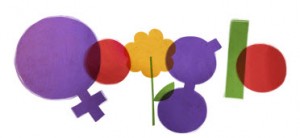
Search Google today? This particular Google Doodle recognizes International Women’s Day, an annual event on March 8th. It is a global day celebrating the economic, political and social achievements of women past, present and future.?áThe?áfirst International Women’s Day event was run in 1911. In some places like China, Russia, Vietnam and Bulgaria, International Women’s Day is a national holiday.
So beyond the fact that women make up over 50% of the world’s population and 90% of the Library Staff, why should we care? Susan Blumenthal, M.D., Public Health Editor at HuffPost and Former U.S. Assistant Surgeon General, has an excellent essay today reflecting upon the changes she has seen in women’s health. ?áWomen’s Health: Decades Later, What’s Still Neglected.
For example, did you know:
- A Congressional Report in 1990 revealed that only 13 percent of the National Institutes of Health budget was spent on women’s health research
- Until fairly recently in our nation’s history (1993), women were largely excluded from being subjects in medical research and data was not analyzed for sex and gender differences
- Women represent only 12 percent of the Deans of U.S. medical schools, fewer than 27 percent of tenured professors and 13 percent of the over 2070 Departmental Chairs in our nation’s medical schools
The good news is, things are changing. The?áNational Women’s Health?áInformation Center (NWHIC) ?áis available ?áthrough a toll free telephone number (800-944-WOMAN) and ?áat?áwww.womenshealth.gov. It?áprovides consumers, health professionals, and researchers with free information and suport for ?áa broad range of women’s health issues. Changing the Face of Medicine?á is an online exhibit from the NIH which explores?áthe many ways that women have influenced and enhanced the practice of medicine. ?áSo the next time someone asks “Where are the girls?” you can show them.
So weÔÇÖre officially halfway through breast cancer awareness month.?á The aim is to educate, empower and promote awareness about the disease. Awareness tip: a mammogram can detect breast cancer up to 3 years before a lump can be detected during a self-exam. Have you had a mammogram?
For more info, please visit:
http://www.cdc.gov/cancer/breast/
http://www.cancer.org/Cancer/BreastCancer/index?ssSourceSiteId=null
Louisiana ranks 48th nationwide in breastfeeding rates? For shame, ladies. These things aren’t just for show, you know.
Breastfeeding reduces obesity in children and builds stronger immune systems. Sure, everyone knows how great breastfeeding is for babies but did you know a mother can burn 500 calories a day breastfeeding? What other time in your life can you lose weight while relaxing in a comfy chair.
During World Breastfeeding Week check out all the benefits of breastfeeding and what resources are available locally for all the hot mammas out there.
Last week, the US Surgeon General Regina M. Benjamin released a Call to Action to Support Breastfeeding. This call to action was aimed at families, communities, employers and health care professionals to improve breastfeeding rates and increase support for breastfeeding. Download the complete report and the fact sheet.

Healthy People provides science-based, 10-year national objectives for improving the health of all Americans. For 3 decades, Healthy People has established benchmarks and monitored progress over time in order to encourage collaborations across sectors, guide individuals toward making informed health decisions, and measure the impact of prevention activities.
Healthy People 2020 continues in this tradition with the launch on December 2, 2010 of its ambitious, yet achievable, 10-year agenda for improving the NationÔÇÖs health. Healthy People 2020 is the result of a multiyear process that reflects input from a diverse group of individuals and organizations.
New topic areas for 2020 include:
Adolescent Health
Blood Disorders and Blood Safety
Dementias, Including AlzheimerÔÇÖs Disease
Early and Middle Childhood
Genomics
Global Health
Healthcare-Associated Infections
Health-Related Quality of Life and Well-Being
Lesbian, Gay, Bisexual, and Transgender Health
Older Adults
Preparedness
Sleep Health
Social Determinants of Health
Stay connected to Healthy People 2020 by signing up for e-mail, following on Twitter, connecting on LinkedIn, or joining the Consortium to stay up-to-date with the latest Healthy People information and events.
Allied Health, Dentistry, Medicine, Multicultural Health, Nursing, Public Health, Publication Alert, Women's Health | Permalink | Comments Off on Healthy People 2020 Launched | Posted Friday, December 3, 2010 by Schiavo, Julie
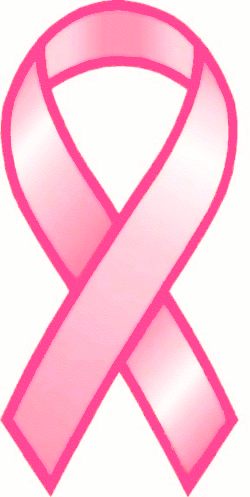 The month of October is a time to think of all persons that have fought the battle against breast cancer. In the U.S., breast cancer is one of the most common cancers among women. According to the American Cancer Society there are nearly 200,000 cases that are expected to arise this year alone. There are a growing number of male cases and that is expected to reach 1,910 by the end of the year. If you or a loved one is facing breast cancer educate yourself on what it is, how it develops and new treatment methods that are available.
The month of October is a time to think of all persons that have fought the battle against breast cancer. In the U.S., breast cancer is one of the most common cancers among women. According to the American Cancer Society there are nearly 200,000 cases that are expected to arise this year alone. There are a growing number of male cases and that is expected to reach 1,910 by the end of the year. If you or a loved one is facing breast cancer educate yourself on what it is, how it develops and new treatment methods that are available.
The American Cancer Society is teaming up with the New Orleans Saints to raise awareness about breast cancer by wearing pink all month long. The items will be auctioned off with all proceeds going to the American Cancer Society. Locally, this yearÔÇÖs American Cancer Society Making Strides Against Breast Cancer raised slightly over $150,000.
For more information, please visit:
http://www.nbcam.org/index.cfm
http://www.cancer.org/docroot/home/index.asp
http://main.acsevents.org/site/TR?fr_id=19718&pg=entry
This year the 10th annual National Women?óÔé¼Ôäós Health Week kicks off today!?é?á It is a weeklong health observance coordinated by the U.S. Department of Health and Human Services?óÔé¼Ôäó Office on Women?óÔé¼Ôäós Health (OWH). This year?óÔé¼Ôäós theme is ?óÔé¼?ôIt?óÔé¼Ôäós Your Time?óÔé¼?Ø.

Some tips to increase physical and mental health include:
Locally there are a few events that are taking place:
Taking it to the Streets ?óÔé¼ÔÇ£ A City Walk and Lunch promoting women?óÔé¼Ôäós mental and physical health (http://www.tulane.edu/~tuxcoe/NewWebsite/com_womens_health/index.html)
Ask your Health Provider ?óÔé¼ÔÇ£ Clinical screening & exam, HIV & STI treatment and/or prevention, Taking the Pledge! (http://www.dhh.louisiana.gov/offices/?ID=264)
So far, Louisiana only has 6 women who took the pledge and is trailing far behind Missouri which has 155 pledges, so take the pledge today!
One week, not enough?
If you?óÔé¼Ôäód like to continue the Woman Challenge there is an eight-week online activity program that allows you to track your progress, so sign up today!

For more information please visit http://www.womenshealth.gov/whw/ .


 myLSUHSC
myLSUHSC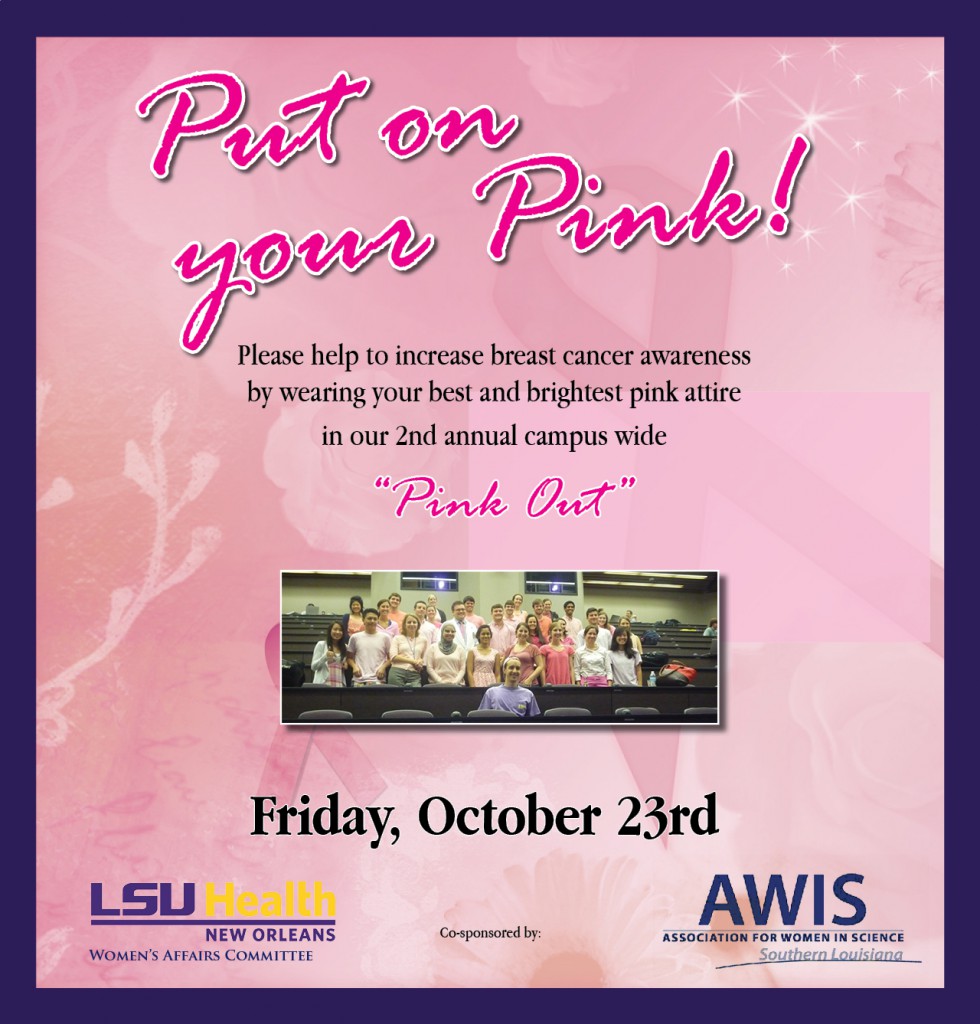





 The month of October is a time to think of all persons that have fought the battle against breast cancer. In the U.S., breast cancer is one of the most common cancers among women. According to the American Cancer Society there are nearly 200,000 cases that are expected to arise this year alone. There are a growing number of male cases and that is expected to reach 1,910 by the end of the year. If you or a loved one is facing breast cancer educate yourself on what it is, how it develops and new treatment methods that are available.
The month of October is a time to think of all persons that have fought the battle against breast cancer. In the U.S., breast cancer is one of the most common cancers among women. According to the American Cancer Society there are nearly 200,000 cases that are expected to arise this year alone. There are a growing number of male cases and that is expected to reach 1,910 by the end of the year. If you or a loved one is facing breast cancer educate yourself on what it is, how it develops and new treatment methods that are available.
